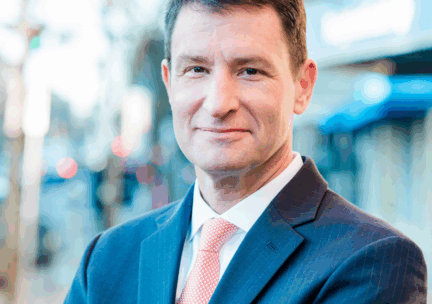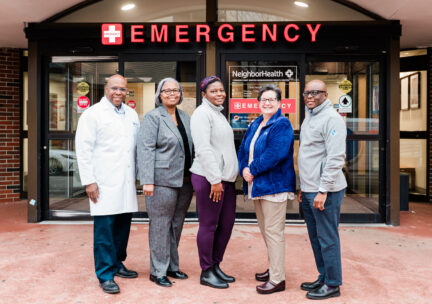NeighborHealth Hosts Policy Panel on Maternal Health Equity, Urging Action on Systemic Disparities
NeighborHealth convenes advocates and legislators to drive change and ensure safe, equitable birth experiences for underserved communities
BOSTON, MA (October 8, 2025) – On Tuesday, October 7, NeighborHealth convened state legislators, healthcare leaders, and public health officials for Maternal Health Legislation in Action: Panel Update – a timely and urgent discussion on the persistent disparities in maternal health outcomes in Massachusetts, particularly those affecting Black and Latino individuals and people with disabilities.
Held at NeighborHealth’s South End location, the panel featured State Senator Liz Miranda of the Massachusetts Legislature who championed the 2024 Maternal Health Omnibus Bill; community health advocates from the Department of Public Health (DPH) – a key state agency that has released critical reports on maternal health inequities; representatives from MassHealth, which plays a crucial role in covering most pregnancies in the state; as well as leaders from the Massachusetts Health Policy Commission and Boston Public Health Commission (BPHC). The panel also included community-based providers and services such as Flourish Care, South Cove, Upstream, and Brockton Neighborhood Health Center, all of whom work directly with birthing individuals and families.
Michael Curry, President and CEO, Massachusetts League of Community Health Centers, offered the event’s opening remarks, which centered on progress towards actionable solutions to improve maternal health outcomes, particularly for Black, Latino, American Indian, and Alaska Native communities who are two to three times more likely to die from pregnancy-related complications than their White counterparts, regardless of income or education levels.
“Too many lives have been lost because our systems have failed to meet the needs of birthing people of color,” said Mimi Gardner, LICSW, MPH, Vice President and Chief Equity Officer at NeighborHealth. “At NeighborHealth, we believe everyone deserves the chance to experience pregnancy and birth safely. This event is an important step toward the systemic changes needed to make that a reality. We’re deeply grateful to the legislators who continue to fight for equity in underserved communities, and to everyone who showed up to be part of the conversation.”
Panelists explored solutions across four key areas: legislative reforms, community-based models, healthcare system transformation, and improved data transparency and accountability. Topics included expanding access to doulas and midwives, increasing culturally competent care, extending postpartum coverage under MassHealth, and the importance of scaling trusted community programs such as group prenatal care and neighborhood health centers.
“Massachusetts is facing a maternal health crisis that disproportionately impacts Black, Latino, and Indigenous communities. I was proud to file and pass the Maternal Health Omnibus Law, which extends MassHealth postpartum coverage, invests in doulas and midwives, and strengthens accountability across our healthcare system. But laws alone are not enough,” said Senator Liz Miranda. “We must continue to listen to families, partner with trusted community organizations, and demand equity and dignity in every birthing experience. I am grateful to NeighborHealth and all the partners in this work for convening today’s important conversation.”
NeighborHealth organized the panel event as part of its broader commitment to advancing health equity and ensuring all residents, regardless of background, have access to compassionate, high-quality, and culturally informed care. Following the passage of the Maternal Health Omnibus Law, NeighborHealth continues to play a vital role in advancing equitable care for underserved communities in Boston.
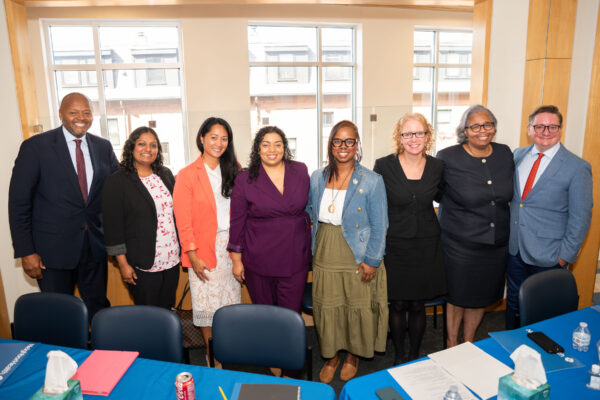
From left to right: Michael Curry, President and CEO, Massachusetts League of Community Health Centers; Viveka Prakash-Zawisza, MD, MS, MBA, FACOG, Senior Medical Director, MassHealth; Elaine Fitzgerald Lewis, DrPH, MIA, Director of the Bureau of Family and Nutrition, MA Department of Public Health; Massachusetts Senator Liz Miranda; Becky Cruz-Crosson, Director of Healthy Start Systems Division, Boston Public Health Commission; Christin Price, MD, Perinatal and Neonatal Quality Improvement Network, MA Department of Public Health; Mimi Gardner, LICSW, Vice President and Chief Equity Officer, NeighborHealth; David Seltz, Executive Director, Health Policy Commission.
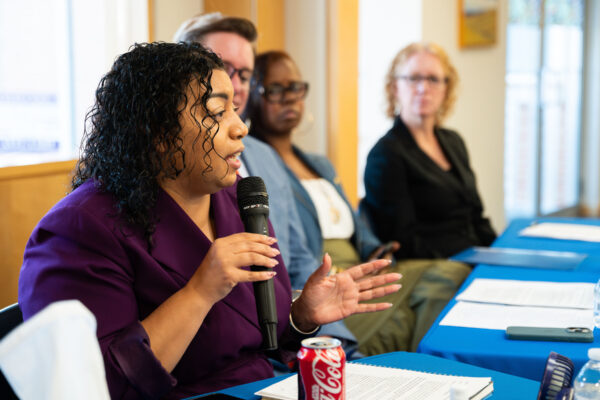
Massachusetts Senator Liz Miranda speaks on NeighborHealth’s State and City panel at Maternal Health Legislation in Action event on October 7 in the South End.
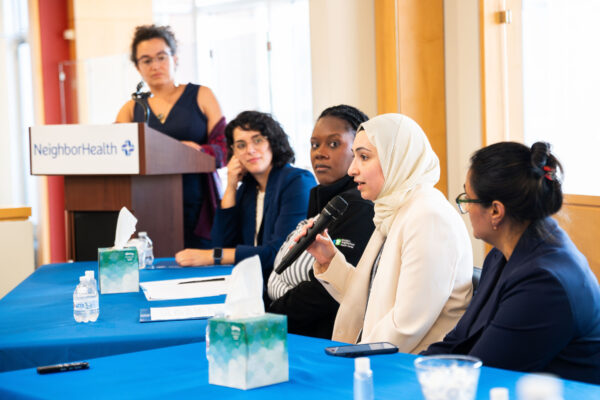
From left to right: Rebecca Herman, CPM, MPH, Director, Community Birth and Doula Integration, MA Department of Health; Emily Chase, NP, Assistant Medical Director OB, NeighborHealth Breastfeeding Program; Jeanie Jeudy, RN, MOM’s Do Care Program Lead RN, Brockton Neighborhood Health Center; Heba Hadad, MD, Medical Director South End Primary Care, NeighborHealth; Sue Ghosh, MD, MPH, Director of Women’s Health Initiatives, NeighborHealth.
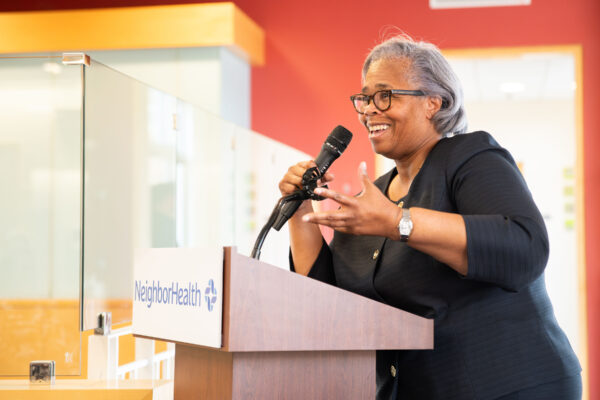
Mimi Gardner, Vice President and Chief Equity Officer of NeighborHealth gives closing remarks at NeighborHealth’s Maternal Health Legislation in Action event.
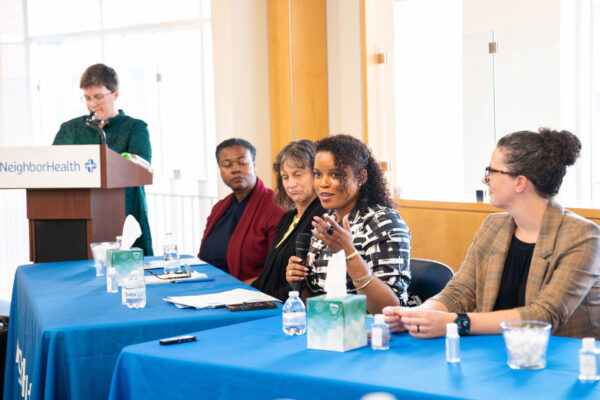
From left to right: Emily Anesta, Bay State Birth Coalition (at the podium); Cheryl Clark, MD, Executive Director and SVP, Institute for Health Equity, Research, Evaluation and Policy; Susan Dargon Hart, LICSW, SVP of Clinical Affairs, Mass League of Community Health Centers; Joanne Suarez, MBe, Senior Program Manager, Fetal and Infant Mortality Review, Boston Public Health Commission; Sarah Fuller, Practice Transformation Lead III, Upstream.
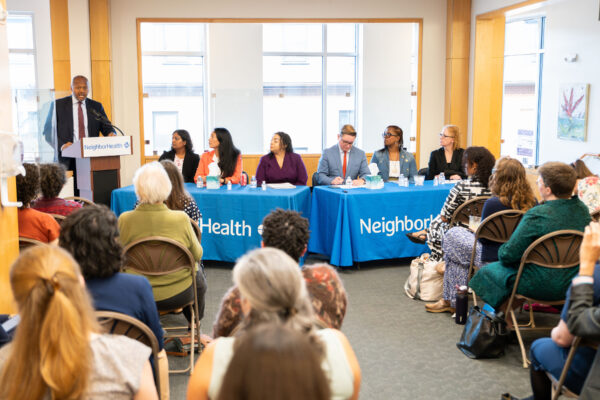
State legislators, healthcare leaders, and public health leaders convene at NeighborHealth’s South End location at 1601 Washington Street for a timely and urgent discussion on the persistent disparities in maternal health outcomes in Massachusetts.
